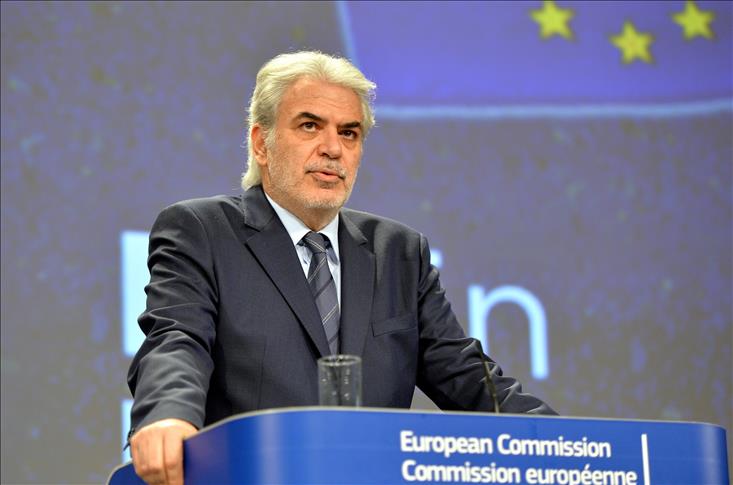
By Ilgin Karlidag
BRUSSELS
Barriers to the flow of relief materials into Nepal have begun to ease according to EU's humanitarian aid chief.
Logistical problems in delivering aid emerged in the aftermath of the devastating April 25 earthquake, which has killed at least 7,650 people, but the EU official said the situation has now improved.
"Despite the limited capacity of Kathmandu airport, more of the necessary assistance is being delivered," European Commissioner for Humanitarian Aid and Crisis Management Christos Stylianides told Anadolu Agency on Wednesday.
"We are aware of the logistical troubles in the aftermath of a disaster - and how important it is to overcome these hurdles and to save lives," Stylianides told Anadolu Agency.
Stylianides said it is difficult to respond in the aftermath of earthquakes, which destroy roads and interrupt electricity and communications.
Nepali government officials have repeatedly called for more international relief agencies to be deployed to remote areas.
"This is particularly valid for Nepal, which is a mountain country and many of the affected places were hard to reach even before the damage caused by the earthquake," he said.
"I saw this for myself last week: many rural areas are reachable only by helicopter, and even that depends on the weather," Stylianides said. "This makes very difficult to assess the situation there and to deliver aid."
The World Health Organization, which has been coordinating medical relief efforts, is concerned that some smaller medical teams arriving in Nepal without the necessary resources could actually become a burden on the health response.
The international community has pledged millions of dollars of aid to Nepal; numerous governments, including regional neighbors China, India and Pakistan have sent search-and-rescue teams.
There had been concerns that relief was being delayed at Kathmandu's airport, with some accusing Nepal's government of trying to control the flow of aid through customs.
"That's not true. There are more than 50 countries trying to bring their relief items with flights to Kathmandu. So, you cannot land your flight at the time you wish, you choose; that's not possible because ours is a very small airport," said foreign ministry spokesman Tara Prasad Pokharel, adding that there was only a "short and simple procedure" for incoming flights to follow.
"There is no desire to control the flights, we need relief materials. We are very grateful to all the countries which are sending materials to Kathmandu. We welcome that," he added.
Turkey has also contributed to search-and-rescue efforts under the Prime Ministry's Disaster and Emergency Management Authority, known as AFAD.
More than 16,000 have been injured according to figures from the Nepali police, while the home ministry estimated that more than 160,000 houses have been completely destroyed in the earthquake.
The EU ambassador to Nepal Rensje Teerink told reporters on Friday that 1,000 Europeans are still missing.
Global community not doing enough in Syria
EU’s humanitarian aid chief has said the international community has not done enough to address the humanitarian crisis in Syria.
The comments by European Commissioner for Humanitarian Aid and Crisis Management Christos Stylianides on Wednesday came three months after the Syrian Observatory for Human Rights reported the death toll in Syria had risen to 210,060 - nearly half of which were civilians - after nearly four years of civil war in Syria.
Stylianides told Anadolu Agency on Wednesday: "I am as concerned as ever about the deteriorating humanitarian situation in Syria."
"Obviously the international community has not been effective if this unacceptable agony can continue for the fourth year in a row," Stylianides told AA.
He added: "In my visits to Turkey and my meetings with my Turkish counterparts, I have expressed our recognition for Turkey for the measures it has taken to host the over 1.75 million Syrian refugees in the country.
"Within the Commission, I am doing my utmost to mobilize all possible resources and constantly remind our member states to do the same."
"The biggest responsibility lies with the fighting parties inside Syria: all sides should lay down their arms and let humanitarian workers reach the people who need their help, " he said.
The Syrian crisis has created the worst global refugee crisis in decades, putting pressure on Western countries to open their borders and help refugees.
The UNHCR has registered 2.2 million refugees in Egypt, Iraq, Jordan and Lebanon, while Turkey has registered 1.7 million Syrians in the country.








